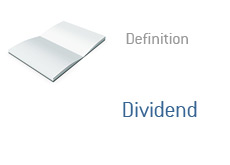Definition of Dividend
What is a dividend? What is the definition of a dividend? Why do some companies pay out dividends, while other companies do not?
A dividend is some form of a taxable benefit that is paid out to the shareholder of a company.
Dividends usually take the form of:
-cash dividend (the most common)
-stock dividend
Many companies pay out their dividends on a regular basis (usually quarterly).
 Why would a company pay out a dividend?
Why would a company pay out a dividend?A company that pays out a dividend is usually a long-established company that generates profits on a very consistent basis.
Dividends are paid out in order to encourage shareholders to continue holding shares in the company, as well as building sustained, long-term shareholder value.
Dividends are paid out of current or retained earnings.
Companies are not required to pay out dividends - many companies do not.
Companies are also not required to continue paying out dividends if they have done so in the past, but cutting or eliminating a dividend is usually a sign of poor health for a company.
--
Davemanuel.com Articles That Mention Dividend:
When the New York Times Almost Got Delisted
Why Do Companies Buy Back Shares?
Warren Buffett: 20 More Years of Outperforming The S&P 500 Since Everybody Wrote Him Off
Should Companies That Paid Billions To Buy Back Shares Be Entitled To Government Bailouts?
How Good of a Stock and Options Trader is Nancy Pelosi?
